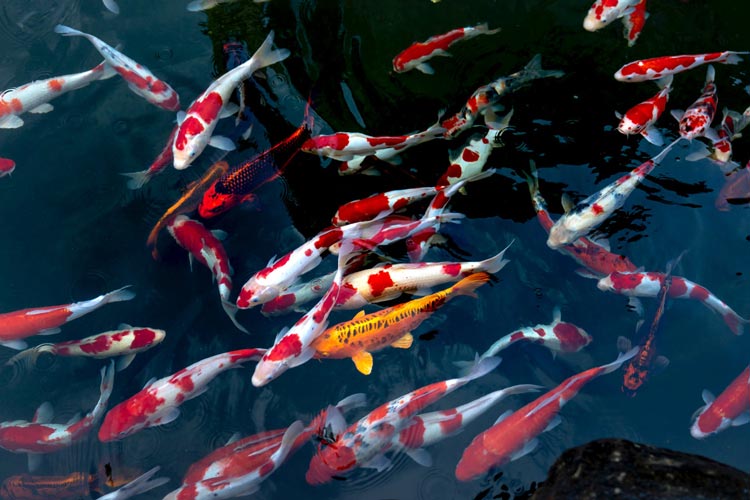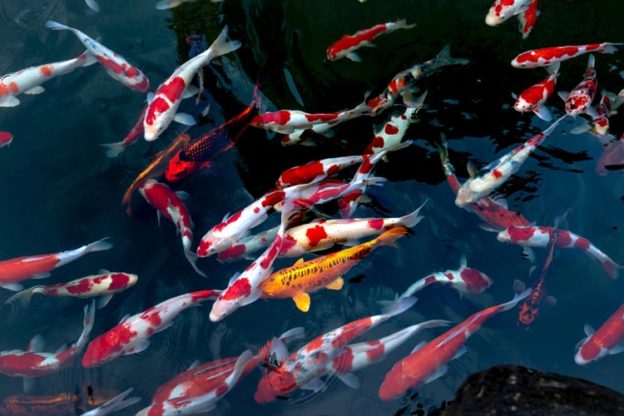
Despite being hardy fish, koi require a lot of care and attention throughout the year. A lot of people might not realize that even in milder winter climates as we have in California, koi pond maintenance still needs to be tailored to each season.
Not only will you need to maintain the quality of water in the pond to ensure that it contains the correct amount of minerals and oxygen, but you will also need to do regular temperature checks and switch over to a weather-appropriate food option for the koi.
This guide will take you through the necessary winter koi pond maintenance, as well as give you our top tips and tricks for maintaining your garden pond and fountain during the colder months of the year.
Switch to Cold-Water Food
New owners of koi fish might not know that they should change the type of food fed to the fish depending on the weather. During autumn, you should begin to mix winter food into the summer food before fully switching over when temperatures begin to dip under 60 °F.
The koi should also receive less food during the winter because lower temperatures cause their metabolisms to significantly slow down. If they ingest too much food during this time, it could be detrimental to their health. Koi food specifically made for winter months is made mainly of wheat germ, which they can digest more easily.
If temperatures get extremely cold in California and regularly stay under 48 °F, you should stop feeding your fish altogether until the weather improves.
Read More: Year-Round Maintenance Tips for Your Koi Pond
Keep the Pond Clean
Most of us are used to raking up piles of leaves during autumn and winter, and your koi pond needs the same treatment.
Leaves, twigs, and sludge naturally build up at a greater pace during wintertime and ponds require diligent cleaning to ensure the pumps and filters continue to work properly. Even worse, leaves that remain in the water for a long time will break down and worsen the water quality due to added levels of ammonia and nitrite.
If you don’t have the time to manually remove the leaves and debris, or worry that you won’t always remember, it is probably a good idea to invest in some pond netting. This netting will prevent leaves from dropping into the water at all, and help keep your fish healthy and swimming through clear water.
Unfortunately, netting won’t be able to keep sludge from building up at the bottom of the water feature. Sludge is usually caused by anything from decomposed leaves to dead algae and can have a big impact on the level of oxygen in the water. To remove sludge, use a quality net or pond vacuum, which are available to rent in most cities. These tools will allow you to effectively clean your pond without the hassle of draining it.
Read More: 3 Best Expert Advice in Taking Care of Your Koi Pond
Maintain Bacteria and Mineral Levels
Koi ponds have a complex ecosystem that needs regular treatment and maintenance.
Koi owners will be aware of how important minerals, bacteria, and oxygen levels are for the health of their fish. Especially with their metabolisms slowed down, koi rely on these nutrients to aid their health and kill harmful parasites that might be living in the water.
Good water bacteria also has the advantage of breaking down any leaves that might have slipped through the pond netting, as well as difficult to reach sludge and debris. Salt is an easy alternative to beneficial bacteria because of its many functions: it makes osmoregulation easier, lowers levels of nitrites, and also kills parasites.
Check Water Temperature
Thankfully, California’s temperature rarely plunges below 48 °F, which means you won’t have to worry about your koi pond freezing over. However, it is still important to regularly check the temperature of the pond to gauge how best to maintain it. Koi are resilient fish though and can easily survive in freezing temperatures, so there is no need to worry if it is especially chilly this year.
Know Who to Call
Even the most diligent koi owner can run into trouble with their pond from time to time. If your pond has become damaged in some way or you worry there is a pond-related emergency, you should call a professional in your area who is experienced with water fountain services and understands the ins and outs of koi ponds.
Due to the delicate ecosystem, it is always best to ask for help when you encounter a blockage deep in the pump system or find it hard to detect a leak.
The Bottom Line
While a mild California winter will be gentler on your koi and pond than harsher climates, you should still take the necessary steps to ensure the ecosystem remains protected, clean, and stable.
Koi thrive on healthy nutrients found in a flourishing pond but can be susceptible to parasites and toxic nitrite levels. By keeping your pond clear of grime and leaves, and regularly checking on the quality of water, you can make sure that your koi stay healthy and strong all year long.
